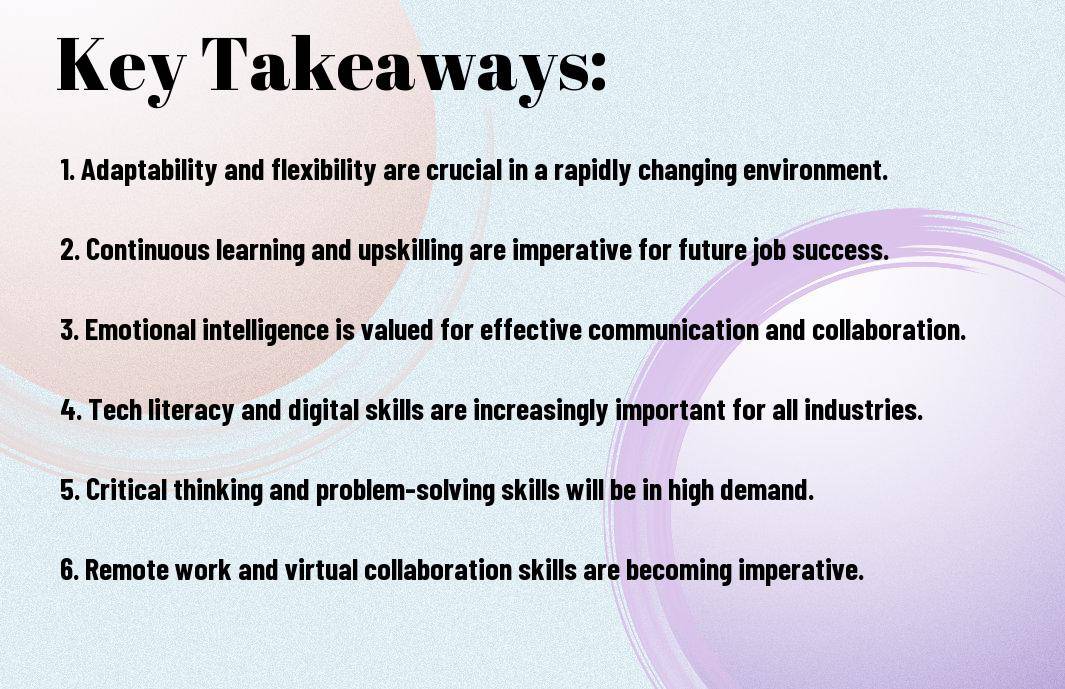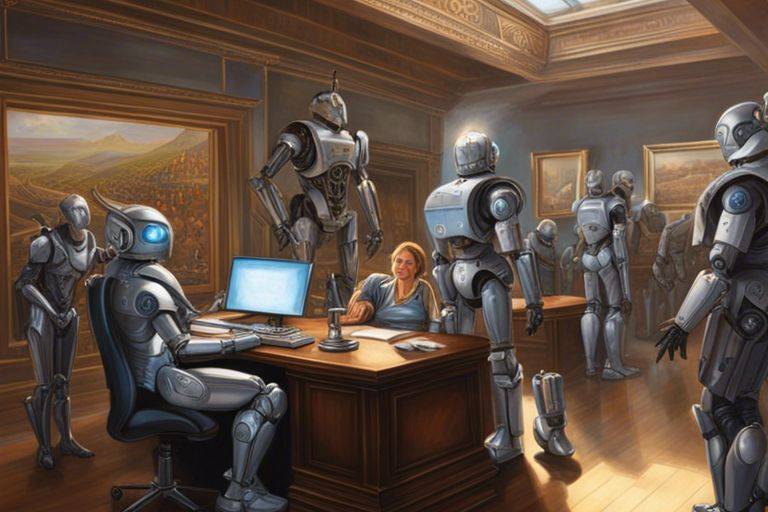Just as the world rapidly evolves, so does the landscape of work. In the coming decade, adaptability, digital literacy, critical thinking, and emotional intelligence will be crucial for professionals aiming to succeed in a rapidly changing work environment. As automation and artificial intelligence continue to reshape industries, individuals must develop a set of necessary skills to stay competitive and relevant in the job market. The ability to learn new technologies quickly, solve complex problems, and work effectively in diverse teams will be indispensable for those looking to thrive in the future of work.

Key Takeaways:
- Adaptability is key: With rapid changes in technology and work environments, being adaptable is important to thrive in the future of work.
- Continuous learning is a must: In order to stay relevant and competitive, individuals need to continuously upskill and reskill themselves.
- Strong communication skills are important: Effective communication, both verbal and written, will be crucial in working with diverse teams and stakeholders.
- Embrace technology: Technology will play a significant role in the future of work, so being comfortable and proficient with various tools and platforms is important.
- Collaboration is key: The ability to work well with others, both in-person and virtually, is crucial in the evolving work landscape.
- Problem-solving skills are valuable: Being able to think critically, analyze situations, and come up with creative solutions will be highly valued in future workplaces.
- Emotional intelligence is important: Understanding and managing emotions, as well as empathizing with others, will be important in building strong relationships and effective teamwork.

Adaptive Skills for a Changing World
Some experts predict that the future of work will require a new set of skills to thrive in a rapidly evolving landscape. According to Defining the skills citizens will need in the future world of work, flexibility and adaptability are key attributes that individuals will need to develop to succeed in the next decade.
Flexibility and Adaptability
Adaptive skills involve the ability to quickly pivot and adjust to changing circumstances. In a world where technology and industries are constantly evolving, being able to adapt to new challenges and environments is crucial. Individuals who possess strong adaptability skills are better equipped to handle uncertainty and thrive in diverse work settings. Flexibility goes hand in hand with adaptability, allowing individuals to embrace change and be open to new ideas and ways of working.
Embracing Continuous Learning
With the rapid pace of technological advancements and the shifting job market demands, embracing continuous learning is vital for staying relevant and competitive. Lifelong learning is no longer a choice but a necessity in today’s world. By constantly acquiring new knowledge and upskilling, individuals can future-proof their careers and remain valuable assets to employers.
Adaptability is not just a buzzword but a critical skill that can make or break one’s career in the future. Those who are willing to adapt, embrace change, and proactively seek learning opportunities will be better prepared to navigate the uncertainties of the evolving work landscape.

Technical Proficiencies
Once again, as we look ahead to the future of work, it is imperative to consider the significance of technical proficiencies. According to Experts on the Future of Work, Jobs Training and Skills, the increasing integration of technology in various industries underscores the need for individuals to possess advanced technical skills to thrive in the evolving job market.
Digital Literacy
One crucial technical proficiency for individuals in the next decade is digital literacy. This skill encompasses the ability to navigate digital tools and platforms effectively, evaluate online information for credibility, and adapt to new technologies as they emerge. In a world where digital transformation is rapidly reshaping the workplace, digital literacy is not just an asset but a prerequisite for success.
Data Analysis and Interpretation
With the exponential growth of data in today’s digital age, the ability to analyze and interpret data is becoming increasingly vital for professionals across industries. Data analysis skills enable individuals to derive valuable insights, make informed decisions, and drive innovation within organizations. Those who can proficiently utilize data analytics tools and techniques will have a competitive edge in the job market of the future.
Proficiencies in digital literacy and data analysis are imperative for individuals looking to thrive in the next decade. Embracing these technical skills will not only open up new opportunities but also facilitate career advancement and professional growth. As automation and artificial intelligence continue to shape the workforce, having a solid foundation in these technical proficiencies will be crucial for staying ahead in the ever-evolving landscape of work.
Critical Thinking and Problem-Solving
Not just reserved for philosophers and academics, critical thinking and problem-solving skills are becoming increasingly necessary in the modern workplace. In a rapidly evolving business landscape, the ability to think critically and approach challenges with a problem-solving mindset can set individuals apart and drive organizational success.
Enhancing Analytical Abilities
Thinking critically involves analyzing information, considering different perspectives, and making informed decisions. To enhance your analytical abilities, it is crucial to practice active listening, ask probing questions, and seek out diverse viewpoints. Additionally, honing skills in data interpretation and logical reasoning can significantly boost your problem-solving capabilities.
Innovative Thinking and Creativity
One of the key components of critical thinking is the ability to think outside the box and foster creativity. Innovative thinking involves generating new ideas, challenging conventional beliefs, and approaching problems with a fresh perspective. Cultivating a creative mindset can lead to breakthrough solutions and a competitive edge in today’s dynamic work environment.
By tapping into your abilities for innovative thinking and creativity, you can adapt to changing circumstances, drive innovation, and inspire others to think differently. Embracing creativity in problem-solving can open up new possibilities and propel your career to new heights in the face of uncertainty.
Communication and Collaboration
Keep The Future of Work: Skills and Jobs in the Next Decade in mind as you navigate the changing landscape of work. In the future, effective communication and collaboration will be more crucial than ever.
Strengthening Verbal and Written Communication
Any successful professional in the upcoming decade must prioritize strengthening both verbal and written communication skills. In a world where remote work and digital communication are becoming the norm, the ability to convey ideas clearly and concisely is a valuable asset. Whether it’s crafting persuasive emails, delivering engaging presentations, or participating in virtual meetings, honing your communication skills will set you apart in the competitive job market.
Teamwork and Interpersonal Skills
Verbal and non-verbal communication play a vital role in fostering teamwork and developing strong interpersonal skills. Collaborative projects and team-based initiatives are on the rise, requiring individuals to effectively express ideas, actively listen, and navigate diverse perspectives. Being able to work harmoniously with others, resolve conflicts diplomatically, and build strong relationships will be key competencies that employers will seek in the future.
This emphasis on teamwork and interpersonal skills underscores the shift towards a more interconnected and globalized work environment. Individuals who can collaborate efficiently across borders, cultures, and time zones will have a competitive edge in the evolving job market. Developing empathy, adaptability, and a collaborative mindset will be crucial for thriving in the dynamic workplace of the next decade.

Leadership and Social Influence
For individuals looking to thrive in the future of work, developing leadership qualities and mastering social influence are necessary skills that can set them apart in the next decade. Leaders in the modern workplace are expected to not only manage teams effectively but also inspire and motivate others towards a common goal. Social influence, on the other hand, is about being able to persuade and guide individuals or groups towards a particular decision or action.
Developing Leadership Qualities
Social influence plays a crucial role in leadership, as leaders need to be able to communicate their vision clearly, build trust among their team members, and influence others to follow their lead. Developing leadership qualities requires mastering skills such as effective communication, emotional intelligence, adaptability, and decision-making. By honing these skills, individuals can inspire and empower others, foster collaboration, and drive positive change within their organizations.
Navigating Diversity and Cultural Sensitivity
Social influence also comes into play when navigating diversity and cultural sensitivity in the workplace. Leadership in this context involves understanding and embracing differences among individuals, fostering an inclusive environment, and effectively managing diverse teams. Cultural sensitivity is crucial for fostering a respectful and harmonious workplace where all employees feel valued and heard.
Effective leaders recognize the importance of diversity and cultural sensitivity in today’s globalized world and strive to create an environment where every individual’s unique background and perspective are respected. By prioritizing these values, leaders can enhance team performance, foster innovation, and create a more inclusive and welcoming workplace culture.
Emotional Intelligence and Resilience
Self-awareness and Self-management
After decades of focusing primarily on technical skills, employers are increasingly recognizing the importance of emotional intelligence in the workplace. Individuals with high emotional intelligence are able to understand and manage their own emotions effectively, leading to better interpersonal relationships and a more harmonious work environment. Self-awareness is the foundation of emotional intelligence. It involves recognizing and understanding your own emotions, strengths, weaknesses, and values.
By developing self-management skills, individuals can regulate their emotions, stay flexible in the face of change, and control impulsive reactions. This ability to manage oneself not only leads to better decision-making but also enhances personal well-being. In the fast-paced and unpredictable future of work, self-awareness and self-management will be crucial for success.
Coping with Stress and Building Resilience
Any professional today knows that stress in the workplace is inevitable. The ability to cope with stress and bounce back from setbacks is what sets high-performing individuals apart. Building resilience is imperative to navigate through challenges and thrive in a constantly changing work environment. Resilient individuals are able to adapt to adversity, learn from failures, and persevere in the face of difficulties.
On the journey to building resilience, it’s important to practice self-care, maintain a positive outlook, and seek support when needed. Developing coping strategies, such as mindfulness techniques, regular exercise, and time management skills, can help individuals manage stress effectively and maintain a healthy work-life balance. Plus, fostering strong relationships with colleagues and building a support network can provide a crucial foundation for emotional well-being in the workplace.
To wrap up
To summarize, the future of work is rapidly evolving, and it is vital to possess the necessary skills to thrive in the next decade. Adaptability, creativity, emotional intelligence, and digital literacy are just a few of the key skills that will be in high demand. By continuously upskilling and staying ahead of the curve, individuals can position themselves for success in the changing landscape of work.
As automation, artificial intelligence, and other technological advancements reshape industries, the ability to learn, unlearn, and relearn will be critical. Embracing a growth mindset and being open to new challenges and opportunities will be key to not only surviving but thriving in the future of work. By focusing on developing these vital skills, individuals can navigate the uncertainties of the future with confidence and resilience.
FAQ
Q: What are crucial skills needed to thrive in the next decade?
A: In the next decade, crucial skills to thrive include adaptability, complex problem solving, critical thinking, creativity, emotional intelligence, cognitive flexibility, and digital literacy.
Q: Why is adaptability an important skill for the future of work?
A: Adaptability is crucial because the work environment is constantly evolving. Being adaptable allows individuals to embrace change, learn new skills, and navigate uncertainty with ease.
Q: How does critical thinking contribute to success in the future of work?
A: Critical thinking enables individuals to analyze information objectively, evaluate different perspectives, and make informed decisions. This skill is crucial for problem-solving and decision-making in complex work environments.
Q: What role does emotional intelligence play in the future of work?
A: Emotional intelligence, which includes self-awareness, self-regulation, empathy, and social skills, is vital for effective communication, collaboration, and leadership. It helps individuals build strong relationships and navigate interpersonal dynamics in the workplace.
Q: Why is digital literacy important for the future of work?
A: In an increasingly digital world, digital literacy is crucial for understanding and utilizing technology effectively. It includes skills such as data analysis, coding, and navigating digital platforms, which are in high demand across various industries.
Q: How can individuals develop cognitive flexibility for the future of work?
A: Cognitive flexibility involves the ability to shift perspectives, adapt to new information, and think creatively. To develop this skill, individuals can engage in activities that challenge their thinking patterns, such as learning a new language or pursuing diverse interests.
Q: What is the significance of creativity in the future of work?
A: Creativity fuels innovation and problem-solving, making it a valuable skill for driving growth and staying competitive. In a rapidly changing work landscape, individuals who can think outside the box and generate new ideas will have a significant advantage.



